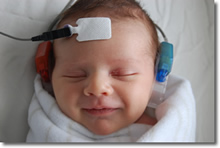 Newborn hearing screening is now mandated across the nation and for a very good reason! According to the National Institutes of Health (NIH), research shows that the most intensive period of speech and language development is during the first three ears of a child’s life. When a child has a hearing impairment, they have a much harder time developing speech and reading skills and will quickly fall behind their peers.
Newborn hearing screening is now mandated across the nation and for a very good reason! According to the National Institutes of Health (NIH), research shows that the most intensive period of speech and language development is during the first three ears of a child’s life. When a child has a hearing impairment, they have a much harder time developing speech and reading skills and will quickly fall behind their peers.
Children learn to talk by imitating the sounds around them; when they cannot hear properly it becomes so much more difficult for them to adequately develop language skills. Newborn hearing screening helps to identify those children who many need to learn language and speech in an alternative way. If a parent or caregiver knows about a child’s hearing loss, they can seek early intervention to correct the problem or implement different strategies to help them learn to communicate successfully.
The incidence of hearing loss in children is actually higher than one might expect; newborn hearing screenings identify about two or three out of every 1,000 babies with either deafness or some other form of hearing impairment. Before newborn hearing screening became mandatory many parents and pediatricians wouldn’t detect hearing loss until about age 2 or 3, when the child failed to develop language skills.
Treatment for hearing loss in small children is not that different than it is for adults. Typically, a hearing aid is used; close monitoring is necessary to ensure it is programmed correctly and is comfortable enough to wear throughout the day. Children tend to benefit from a speech therapist as well since hearing impaired individuals hear sounds differently than others. If after using hearing aids, a child still has difficulty hearing, an audiologist will consider a cochlear implant as another alternative.
The next big step for newborn hearing screening is proper follow up. National data has suggested that about fifty percent of babies who fail their newborn hearing screens don’t follow up and end up falling through the cracks. The American Academy of Pediatrics has a recommended plan for physicians to follow in regards to early hearing detection and intervention. It is important to discuss any suspected hearing concerns with your pediatrician and to make sure that regular hearing screenings with an audiologist are conducted. If a hearing impaired baby is referred for intervention services before the age of 6 months, there is a much greater opportunity for a successful outcome.

